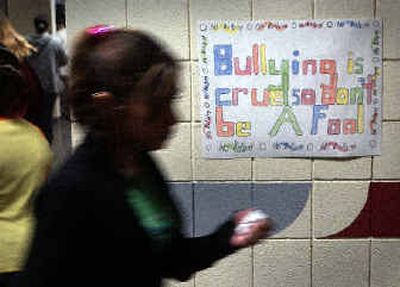Middle schoolers take bullying by the horns

The lunchroom has long been a place of fear, particularly for new students in middle schools.
Thursday morning at Garry Middle School, a girl tripped, scattered her tray and spilled milk on her hair while banging her knee, said Rachel Overland, a student at the table. Two of Overland’s friends helped the girl while tables of children laughed hysterically.
Overland, a member of a new student leadership group, squared up to the teens and said sternly, “That’s not funny. She got hurt.”
Some students stopped jeering. “Some just kept laughing,” she said.
Seventh and eighth grades can be tough on kids. National and state studies show incidents of harassment and bullying increase dramatically during the transition from elementary school to middle school.
In an effort to reduce the daily nastiness they see from their classmates, a squad of students at Garry formed a group called PEAK, which stands for Promoting Everyday Acts of Kindness. Garry students came up with the name and started the program to reduce bullying and other types of harassment.
Starting this week, PEAK is leading a schoolwide observance of No Name-Calling Week, a national event inspired by a young adult novel called, “The Misfits,” by James Howe. The book is about a group of students trying to survive frequent mocking based on their size, sexual orientation and gender.
No Name-Calling Week was created by a New York organization called the Gay, Lesbian and Straight Education Network.
All week long, students at Garry and across the nation will take part in discussions on name calling based on appearance, sexual orientation and cultural background. With the help of $150 grant from the Spokane Public Schools equity office, students at the middle school will receive T-shirts celebrating the week. Students will also be asked to pledge not to bully or harass one another.
The hope is that insults based on social labels – like preppie, jock, poser, skater, gay and teacher’s pet – will be put aside for the week.
Overland and three of her friends, who are also members of PEAK, said they experience and witness teasing and horseplay on a daily basis.
The students who seem to get targeted the most at Garry are those who somehow look a little different, said Britni Collins.
There are some boys at the school who aren’t typical muscular athletes; they dress more fashionably than most guys and they get teased for it, Collins said. Students who take their studies seriously and want to make it through the day quietly are targets too, she said.
“They don’t walk tall in the halls,” Collins said. “They hide. They don’t say anything.”
It’s as if her classmates believe it’s their duty to pick on students who are different, she said.
“School is supposed to be a safe place. It’s like a second home,” Collins said. “When bullies come, it’s like trashing everything the teachers work for.”
Garry counselor John Schutz said every school in the nation contends with these issues. Last year, for the first time in his 13 years at Garry, he started hearing from some students who were feeling suicidal because they were being harassed.
Garry is one of the smaller middle schools in Spokane Public Schools with 650 students and a free-and-reduced meal rate nearing 80 percent.
Schutz and other educators at Garry sought training on the issue. This fall they asked students in a survey to nominate classmates who’ve come to the aid of others. The top 100 vote-getters, and other students, were invited to discuss forming a group to battle harassment.
All they had to do was fill out an application and agree to attend weekly meetings before school. Almost 30 students signed up. Now in its third week, the no-name-calling event has been the group’s main focus so far.
“I think it will help a lot with the problem,” said Overland. “Last year it was pretty bad.”
Denise Fitch, administrator of Washington state’s School Safety Center, praised the Garry program.
“I love the fact kids are leading the way,” Fitch said. “This whole issue of bullying and harassment didn’t start overnight, and it won’t stop overnight.”
In 2002, the state Legislature passed a law requiring all public school districts to either adopt or amend their policies to address acts that interfere with a student’s education. By August 2003, all districts were required to have policies in place. About 11,000 state educators were trained to develop a flexible and informal system that encourages students to come forward, Fitch said.
Spokane has been ahead of the state requirements, said Vickie Countryman, director of Spokane Public Schools’ equity office, which deals with issues like discrimination and harassment. The office also offers staff development programs.
Five years ago, the district launched a program to break up rigid segregation in school lunchrooms by challenging students to mix up where they sit and with whom. The district has about eight anti-harassment programs in place at middle schools, and several other efforts at the elementary and high schools.
“Kids can’t learn if they are scared, which is why climate and environment are so important,” Countryman said.
Garry has been challenged by some individual situations. Overland said one student threatened to kill her when his amorous overtures were rejected. Her counselor helped remedy the problem, she said.
Pam Silva, the grandmother of a special education student, said he’s been taunted since arriving at Garry in 2003.
“I pulled my grandson out of school and came directly to the district,” Silva said.
This year, her grandson is back at Garry, is part of PEAK, and has been paired with a student mentor. Silva feels good about her contacts with the equity department.
“I think this department needs to be vocalized. It needs to be publicized. It needs to be known,” Silva said.